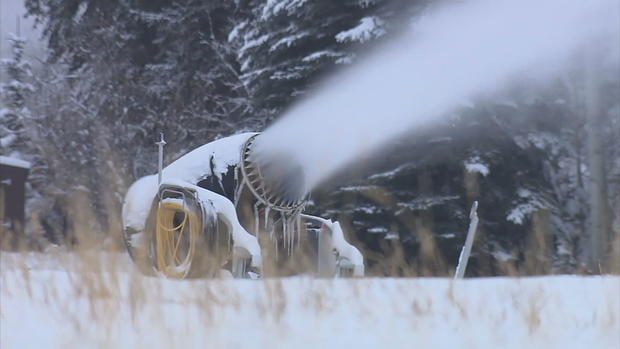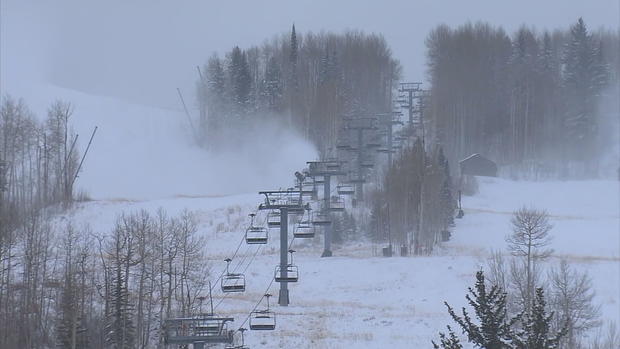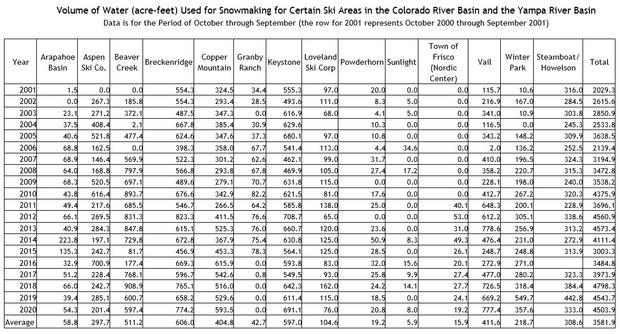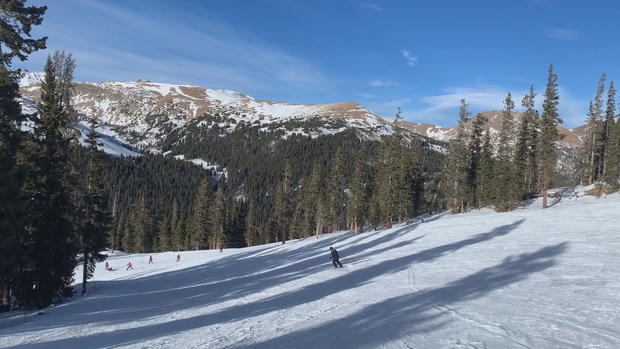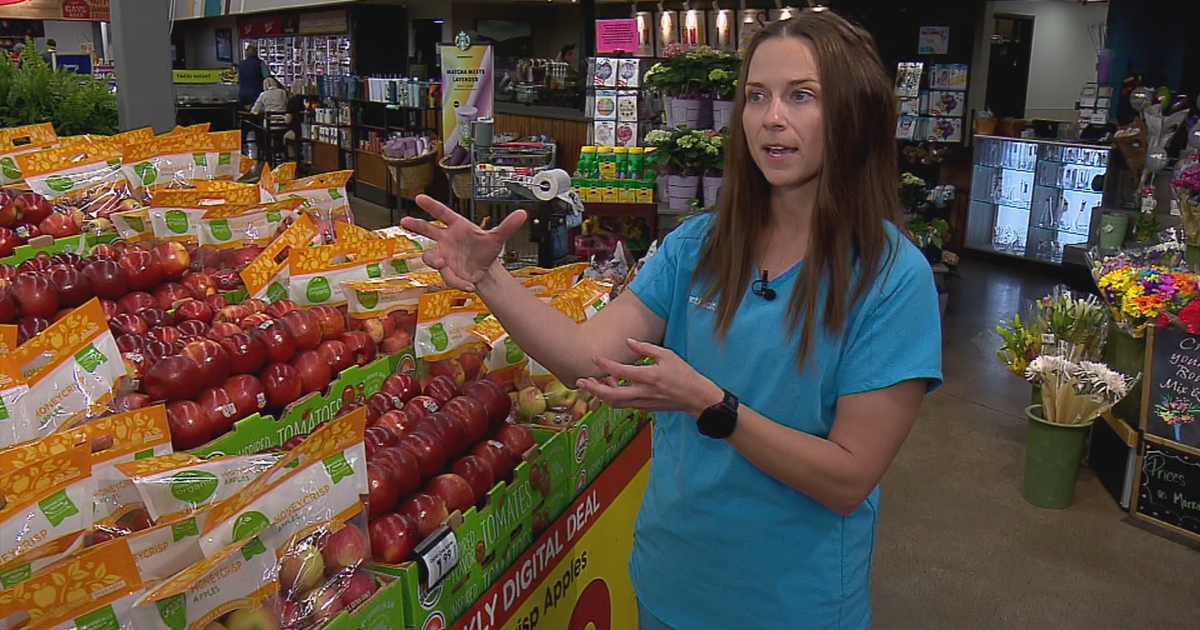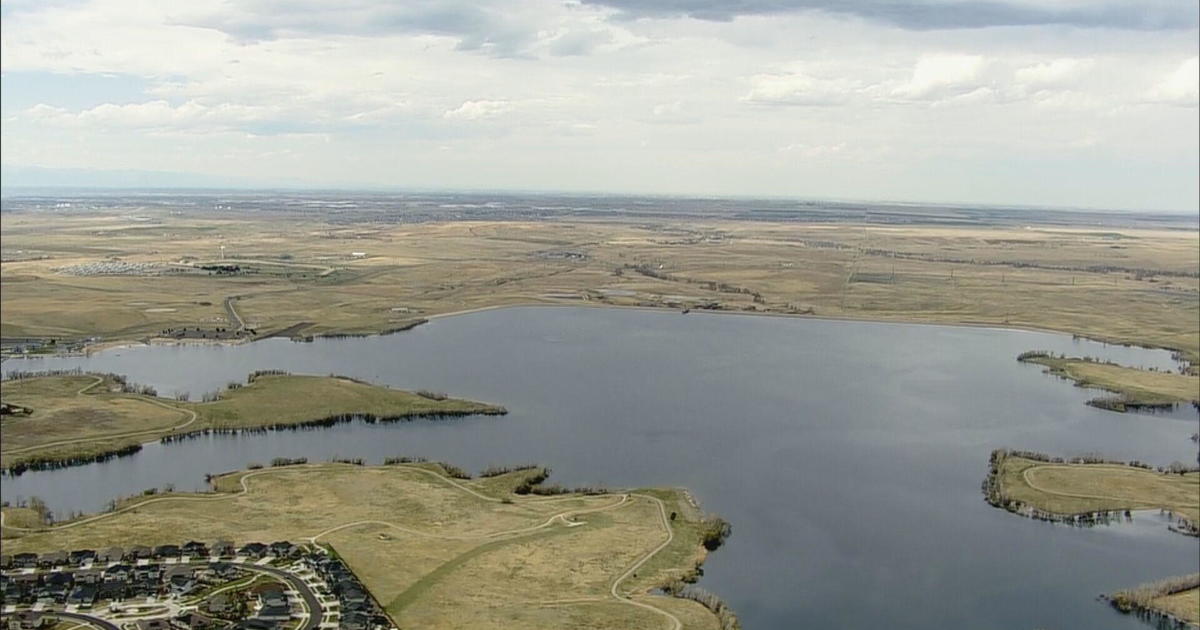Amid Drought, Snowmaking Operations Statewide Use About 2.2 Billion Gallons Of Water, But It's Just A Drop In The Bucket Compared To Other Industries
(CBS4) - With the abnormally dry, warmer weather this year, some ski areas have really felt the pinch, not being able to open as many runs as early as usual. So, CBS4 Investigates took a closer look at how that's affecting the amount of water ski areas are using to make snow in the middle of a drought.
According to state data, snowmaking operations statewide use, on average, about 2.2 billon gallons of water every year, that's about 3,455 Olympic swimming pools.
While that might seem like a lot, the snow-making industry uses only 0.05% of the state's water that's diverted to human uses. The agricultural industry uses most of the state's water - 85% of it - that's a whopping 4.1 trillion gallons of water a year - or 6.2 million Olympic swimming pools.
The state's department of natural resources regulates how much water each business is allowed to use.
"The amount of water that they're allowed to use is usually specified in a water court decree or some other plan that's approved by our office," explained Kevin Rein, the Colorado Department of Natural Resources Division of Water Resources Director. "They're responsible for tracking the amount of water they take, and they're responsible for being able to report that to us so that we can ensure that they're using water again, consistent read their water right, as it's decreed or otherwise approved."
But there's one issue some environmentalists question: big industries like ski resorts are locked into the amount of water they are able to use every year, having what's called "senior" water rights they applied for years ago when snowmaking operations first began.
The resort could petition to increase it, but it doesn't go down. Thus, the quantity isn't changing every year dependent on climate change factors - like if the water source is becoming scarcer.
Rein says if there isn't any water left, the division won't allow the industry to use it.
"If the ski area wants to take their amount of water for snowmaking, let's just say that's not available today in the river because climate change has changed that river, then they can't take it, and that's how we would address it," he said. "If they take that water and it's not legally available to them, we won't let them, we curtail them. That would be a prompt for them to maybe go get additional plans to use water out of priority and replace that water through a plan that would be approved by our corporate by office."
But Rein says neither the state nor the federal government has the authority to curtail water usage before the water resource dries up, for any industry that has obtained a water right.
"We don't have that authority or responsibility to cause them to maybe use less today, maybe save more for later, maybe be mindful of the future, that's not in our authority, and that's why they got the water right, is so that they could rely on it to be able to use it," Rein said.
At Loveland Ski Area, snowmaking is considered a fine art. They've been making snow since the 1960s.
While it has been an unusual year, Loveland's head of trail maintenance Mark "Straightey" Eldring tells me the resort is better off now than it was this time last year.
"We actually have more trails open now with snowmaking than we did at this point last year, and that's mostly because of dry weather," Eldring said. "But we've had pretty good temperatures and we've had some very good nights with low wind."
Of the major ski areas in the Colorado River and Yampa River Basins, Breckenridge uses the most water on average a year for snowmaking - more than 197 million gallons of water per year - that's about 300 Olympic swimming pools.
State data shows Loveland uses 34 million gallons of water on average a year for snowmaking - that's only 51 Olympic swimming pools. See the below table for a list of water usage in acre-feet at area ski resorts. Note, one acre-foot is equivalent to 325,851 gallons.
However, the state says about 80% of the water used for snowmaking gets recycled back into the watershed at the end of the ski season.
That means, for example, at Loveland, about 6.8 million gallons of water a year is not returned to the watershed, and for Breck, that's 39.4 million gallons that doesn't go back.
Vail Resorts, which owns Breckenridge, Vail, Beaver Creek, and Keystone, wrote to CBS4 in an email, "the water used for snowmaking is largely non-consumptive. Our resorts serve as 'cold storage' for water in the winter, and during spring runoff most of the water cycles back into the local watershed. Also, investing in energy-efficient snowmaking technology allows us to manage resources more efficiently and create more snow using less energy."
Eldring says snowmaking is an important use to benefit the state's economy, and it helps water to be stored for the summer.
"Summertime obviously here there's a lot more water usage with people washing their vehicles or, you know, watering their lawns and stuff like that, so, essentially what we're doing out here is cold storage, you know, we freeze it, it stays on-site, and then throughout spring as it slowly gets warmer here and into the heat of summer where it's maybe not that warm up here, it's slowly melting and slowly replenishing that watershed," Eldring said. "So, it's a sense essentially, like putting a big cold storage plant up on a mountain and slowly feeding the Denver community and further downstream as summer really heats up and that water is really needed."
And to put it simply, he says having this snow is just good for people's mental health.
"What I enjoy is coming in in the afternoons to begin my shift and just see people happy, see people sliding down the snow, and see people really happy, and that's what drives me to keep opening more terrain," Eldring said.
Loveland will end its snowmaking operations within the next 10 days. Vail Resorts said it will wrap up snowmaking around the New Year.
